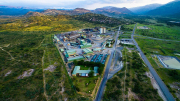
Tesco, the largest supermarket chain in the UK, is struggling to increase profits this year due to the unprecedented levels of inflation affecting its supply chain. The company's Chief Executive,
Ken Murphy, stated that they have been grappling with the rising costs of products from suppliers while also trying to prevent customers from being lured away to discount chains. Tesco announced that its retail adjusted operating profit, which excludes petrol, would be "broadly flat" this financial year. It disclosed that the measure of profits fell 6.3 per cent to £2.4bn in the year to February, in line with expectations. Overall pre-tax profits halved to £1bn.
To prevent shoppers from defecting to rivals, Tesco has invested in several initiatives such as matching discount chain Aldi on prices. Murphy claimed that they are the most competitive they have ever been on price. Price increases at Tesco were "meaningfully lower" than the headline grocery inflation rate of 17.5 per cent recorded in March by Kantar. Tesco customers have been swapping more expensive red meat for white meat to lower their food bills, as well as cooking more meals at home and increasingly using up leftover ingredients.
The chief executive predicted that inflation would come down later this year, led by falling prices in commodities such as oil and grain, but the price of rice and protein would remain higher. The chain, which has more than a quarter of the UK's grocery market share, said it was aware of the pressures its suppliers were facing from high day-to-day costs, including higher energy bills, but it was not "afraid to have direct conversations when necessary in the interest of our customers".
Murphy argued that Tesco was "very balanced in its approach with suppliers" although it has been able to use its size to secure better terms than competitors on certain items. Last summer, the chain was embroiled in a dispute over pricing with Kraft Heinz that led to temporary gaps on shelves. The group's full-year sales climbed 5.3 per cent to £57bn. Including fuel, revenue rose 7.2 per cent last year to £65.7bn.
Zoe Gillespie, investment manager at RBC Brewin Dolphin, said: "While profits are expected to be flat for the year ahead, the continuation of its share buyback scheme and strong execution of its strategy mean Tesco remains in good shape." Tesco's shares, which are up about 19 per cent this year, rose 2 per cent on Thursday morning.
In addition to the inflation issue, Murphy was asked about allegations of workplace misconduct at the Confederation of British Industry (CBI). He stated that the allegations were "clearly very serious", but declined to comment further on whether Tesco would review its membership until "the investigation has run its course". Tesco chair John Allan was previously president and vice-president of the employers' organisation.
In conclusion, Tesco, the UK's largest supermarket chain, is facing unprecedented levels of inflation affecting its supply chain, leading to flat profits this financial year. The company is trying to prevent shoppers from defecting to discount chains by investing in several initiatives such as matching Aldi's prices. Tesco customers are swapping more expensive red meat for white meat to lower their food bills, as well as cooking more meals at home and increasingly using up leftover ingredients. Despite these challenges, Tesco remains in good shape and continues to execute its strategy. Photo by Chrisloader, Wikimedia commons.








































